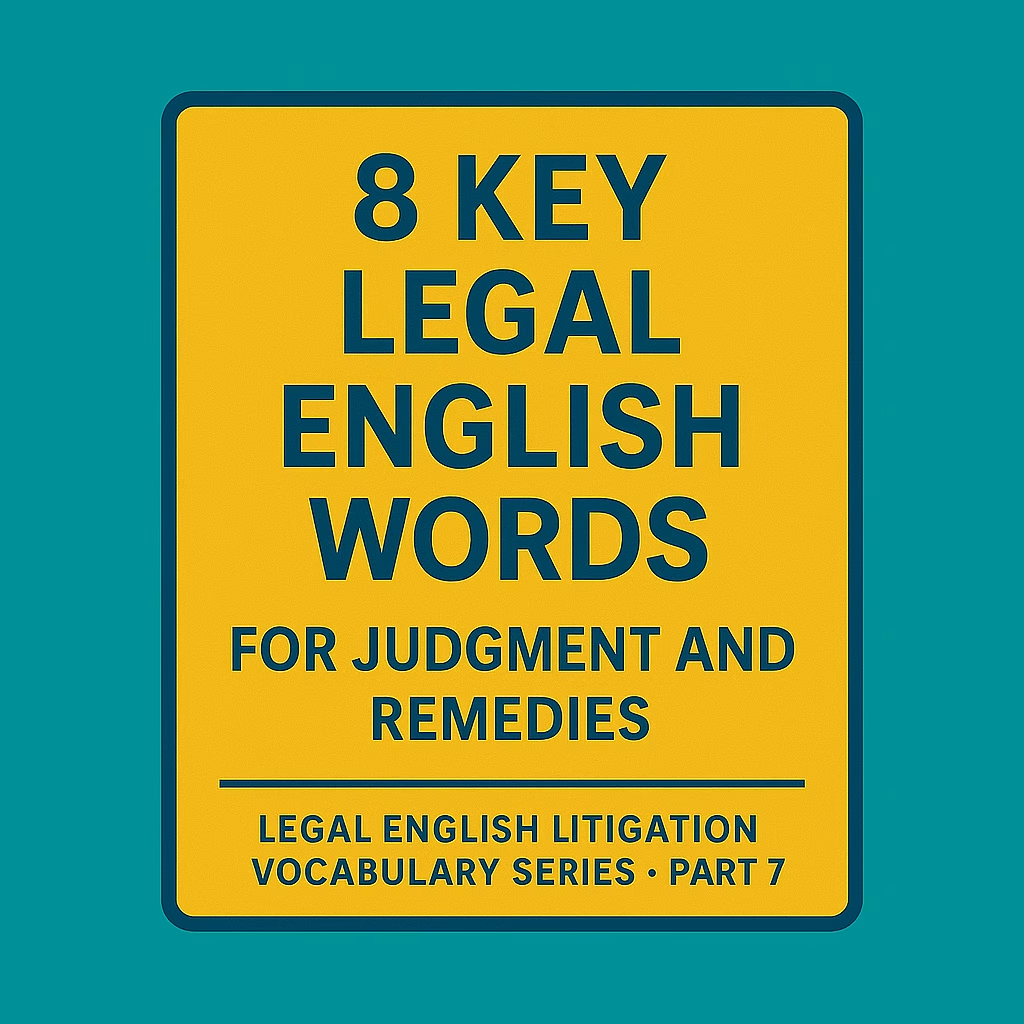
Introduction To Judgment & Remedies.
When a trial concludes, the court enters its decision—and the consequences become real. Whether seeking financial compensation, injunctive relief, or a final declaration of rights, attorneys must be fluent in the specialized Legal English used to discuss judgment and remedies. This post—Part 7 in our 8-part Litigation Vocabulary Series—offers essential legal vocabulary to help international lawyers confidently navigate post-verdict proceedings and enforce outcomes across jurisdictions.
8 Key Words for Judgments and Remedies
1. Verdict
Definition:
The final decision by a jury (or a judge in a bench trial) on the issues presented during trial.
Example:
The jury returned a verdict in favor of the plaintiff, awarding $500,000 in damages.
Legal Context:
The verdict may be general (a simple decision for one party) or special (answering specific factual questions). It forms the basis for the court’s judgment and must be consistent with the instructions and law.
- General verdict: A blanket decision on liability and damages.
- Special verdict: A decision that breaks down findings on each legal element.
2. Judgment
Definition:
The official decision of the court that resolves the legal dispute and concludes the case.
Example:
The court entered judgment in favor of the defendant and dismissed the case with prejudice.
Legal Context:
Judgment may include monetary awards, declaratory relief, or injunctive orders. It may be final or interlocutory (temporary). Lawyers may also move for post-judgment relief to modify, enforce, or appeal the judgment.
- With prejudice: The case is permanently dismissed and cannot be refiled.
- Interlocutory judgment: A ruling on part of the case that does not resolve all issues.
3. Compensatory Damages
Definition:
Monetary compensation awarded to make the injured party whole.
Example:
The court awarded $250,000 in compensatory damages for lost wages and medical expenses.
Legal Context:
These damages aim to restore the plaintiff to the position they were in before the harm occurred. Common categories include economic (like lost income) and non-economic (like pain and suffering) damages.
- Economic damages: Tangible, quantifiable losses.
- Non-economic damages: Intangible harms such as emotional distress.
4. Punitive Damages
Definition:
Damages awarded to punish the defendant for egregious conduct and deter future wrongdoing.
Example:
The jury awarded $1 million in punitive damages due to the defendant’s intentional fraud.
Legal Context:
Punitive damages are not tied to the plaintiff’s loss but instead focus on the defendant’s misconduct. They are awarded in addition to compensatory damages and are subject to constitutional limits in some jurisdictions.
5. Injunction
Definition:
A court order that requires a party to do or stop doing a specific act.
Example:
The court issued a permanent injunction barring the company from using the plaintiff’s trademark.
Legal Context:
Injunctions may be temporary, preliminary, or permanent. They are often used in intellectual property, employment, and commercial disputes. To obtain one, the party must demonstrate irreparable harm and lack of an adequate remedy at law.
- Irreparable harm: A type of injury that cannot be adequately compensated by money.
- Remedy at law: A legal (usually monetary) solution rather than equitable relief.
6. Declaratory Judgment
Definition:
A legal determination that resolves uncertainty by declaring the rights or obligations of parties.
Example:
The court entered a declaratory judgment affirming the plaintiff’s right to terminate the contract.
Legal Context:
Declaratory relief is often used preemptively to resolve disputes before they escalate. It provides clarity, especially in contract and insurance cases, without necessarily awarding damages.
7. Costs and Fees
Definition:
Court-ordered payment of litigation expenses and, in some cases, attorney’s fees.
Example:
The prevailing party moved for an award of costs and attorney’s fees under the contract’s fee-shifting clause.
Legal Context:
Typically, the prevailing party may recover costs such as filing fees, transcripts, and service fees. Attorney’s fees are only awarded when authorized by statute, contract, or specific court rules.
- Fee-shifting clause: A contract provision requiring the losing party to pay legal fees.
- Prevailing party: The party that achieves a favorable judgment.
8. Equitable Relief
Definition:
A remedy that involves non-monetary court action, such as injunctions, restitution, or specific performance.
Example:
The court granted equitable relief by ordering the return of property rather than monetary compensation.
Legal Context:
Equitable remedies are discretionary and based on fairness. They typically apply when legal (monetary) remedies are insufficient. Equitable principles—such as clean hands and balancing the equities—guide these decisions.
- Clean hands doctrine: A party seeking equity must be free of wrongdoing.
- Balancing the equities: The court considers fairness to both sides when granting relief.
Conclusion
Understanding the vocabulary of judgment and remedies is essential not just for winning a case—but for securing a result that actually serves your client’s interests. Whether negotiating a settlement, seeking injunctive relief, or filing a motion for attorney’s fees, mastery of this Legal English allows attorneys to act decisively and precisely in post-trial litigation.
For further information.
Judgment – Legal Information Institute
Injunction – U.S. Courts Glossary
Build Your Legal English Skills with Confidence
Clear, confident communication is essential for every lawyer. Whether you’re working on conversations, meetings, or documents, strong Legal English helps you succeed. Book a free coaching session and start building skills you can use in any area of legal practice.
Disclaimer
DISCLAIMER: The content provided herein is only for discussion purposes and may contain errors. The reader is responsible to confirm the accuracy of the information provided. The content does not constitute legal or professional advice. We disclaim any liability for any loss or damage incurred directly or indirectly from the use of this information.

